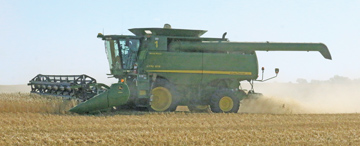Current Temperature
9.3°C
It’s been quite the ride for Forty Mile farmers this fall
Posted on October 15, 2019 by 40 Mile Commentator Commentator/Courier File Photo
Commentator/Courier File PhotoBy Scott Schmidt
Alberta Newspaper Group
A little unpredictable weather at the end of harvest season is becoming quite the opposite lately, as a third straight autumn has opened with snow and below-zero temperatures.
While it hasn’t been a real issue for most dry-land farmers, who are reportedly all but wrapped up and onto to winter preparations, crops like sugar beets, potatoes and beans need to stay in the ground longer, and that has had irrigation farmers delayed and, in some cases, in limbo.
“I was talking to a potato grower and it sounds like there is going to be a number of them in the area, with (Thursday’s) frost, that might be the final nail in the coffin, and those still in the ground could be potentially discarded,” says Steve Wikkerink, country reeve and an irrigation farmer.
Grain yields were good on the irrigation side, Wikkerink says. He’s also heard good numbers for bean crops, even though some are still in the ground and threatened by frost. Sugar beets are in limbo, with receiving stations shutting down after 20,000 tonnes arriving in a short few days, much of it with frost buildup.
Beets in the east of the county are in better shape than the west, as temperatures have been a little higher closer to Bow Island than elsewhere. And fertilizing has been non-existent to this point, as temperatures must improve before that can begin.
On the dry land side, yields are down but it isn’t something farmers are surprised by.
“Dry-land yields are down from previous years,” says Darrell Van Arragon, Forty Mile’s agricultural fieldman, himself a farmer in the county’s south. “But considering the moisture that we had — and I don’t want to suggest it isn’t disappointing — but given the moisture, I think the crops are fair.”
As crops come up, farmers follow behind with preparations for winter and the following spring.
“Depending on weather, they’ll be doing some weed control for next year,” says Van Arragon. “There might be the odd one that puts some fertilizer down this fall, but generally that will get done in the spring when they’re seeding.”
After another summer without sufficient rain, farmers in southern Alberta will no doubt take what they can get, though fall moisture is probably more helpful to ranchers than crop growers.
“Before this last snow that we had, it wasn’t super dry but this is southern Alberta so there is always moisture concern,” Van Arragon says. “But having that snowfall makes a huge difference because that moisture really sinks in when the ground isn’t frozen yet.
“Things could change by spring, too, though. The dry-land farmers depend on that spring moisture — you gotta have that.”
Leave a Reply
You must be logged in to post a comment.

